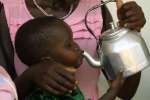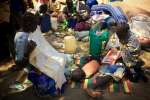- Text size
 |
|  |
|  |
| 
- Français
UNHCR relocating Sudanese refugees to decongest crowded sites
Briefing Notes, 12 June 2012
This is a summary of what was said by UNHCR spokesperson Adrian Edwards – to whom quoted text may be attributed – at the press briefing, on 12 June 2012, at the Palais des Nations in Geneva.
Over the weekend, UNHCR and humanitarian partners moved 8,000 Sudanese refugees from a transit site in northeastern South Sudan following several deaths, and potential new arrivals of up to 15,000 refugees into Upper Nile state.
Last week, MSF reported seven deaths among recent arrivals at the transit site of Hofra, about 25 km from the border with Sudan. The deaths are believed to be linked to the weak state the refugees arrived in after walking for weeks from Blue Nile state with little to eat or drink. These risk factors are amplified by the dwindling supply of water in Hofra, also known as Rum.
The weekend emergency relocation began after food and other relief items had been distributed to all 32,000 refugees in Hofra. UNHCR took the refugees to another transit site called Kilo 18, where an estimated two weeks of water supply is available. MSF has moved its water treatment facility and field medical centre and is maintaining a 24-hour presence there. UNHCR airlifted high-energy biscuits and soap from Malakal while ACTED is constructing emergency shelters for the most vulnerable.
From Kilo 18, the refugees will be relocated permanently to UNHCR's newest camp in Upper Nile, called Yusuf Batil. Two recently-drilled boreholes in Yusuf Batil have produced a promising yield of water. The first borehole is producing 7.5 cubic metres of water per hour. The second one is expected to produce the same quantity. The combined volume of water could sustain a population of 20,000. However, mandatory testing is required, to ensure that the volume of flow from these sources is sustainable.
The other camp in the area, Doro, is filled to capacity while Jammam camp has been plagued by inadequate water supply as refugee numbers have multiplied.
UNHCR is working with the South Sudanese authorities and local communities to identify additional refugee sites outside Maban county, where the refuges are currently hosted. We are searching for a suitable site in Melut county where water would be sourced from the Nile – the hope being to relocate refugees from Jammam camp to ease the pressure on limited water supplies.
South Sudan is currently hosting over some 150,000 refugees from Sudan. Over 105,000 of these are in Upper Nile state, while a further 51,000 are in settlements further west in Unity state. Unconfirmed reports, mainly from refugees themselves, indicate that up 15,000 new arrivals could enter Upper Nile state shortly.
For more information on this topic, please contact:
In Maban: Pumla Rulashe on mobile +211 922 407 462
In Juba: In Juba: Terry Ongaro on mobile: +211 927 770 040
In Nairobi: Vivian Tan on mobile +254 735 337 608
In Geneva: Fatoumata Lejeune-Kaba on mobile +41 79 249 3483

















































